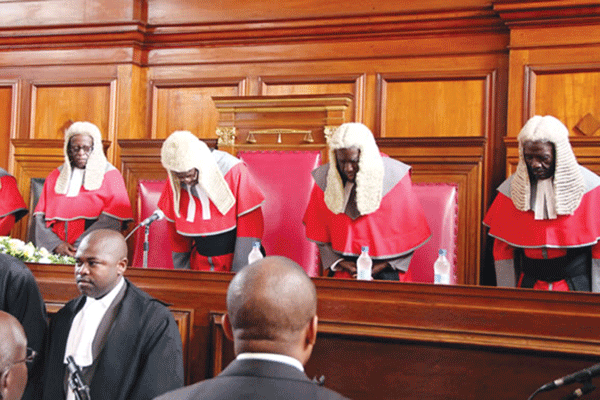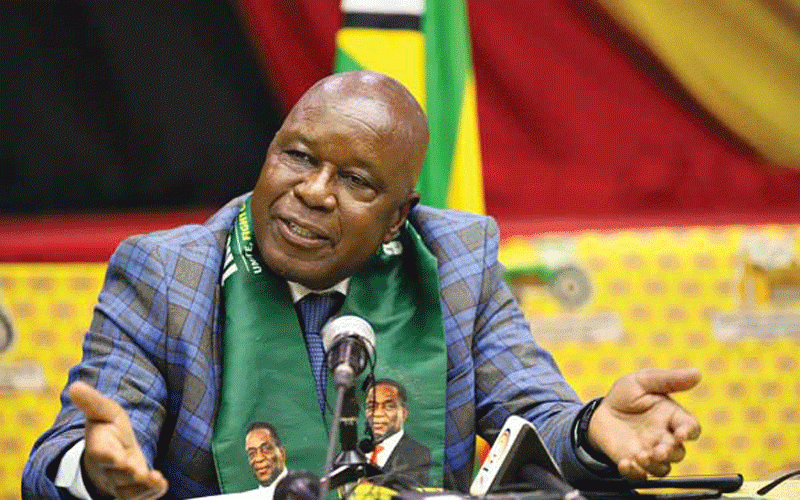
In June 2016, the Judicial Service Commission (the JSC) flighted adverts for judgeship of the High Court of Zimbabwe, inviting both the President and the members of the public to make nominations to fill eight vacancies in the High Court.
Matshobana Ncube and Kucaca I Phulu

A record number of nominations were made which numbered around 51 persons. Those who were nominated were then supposed to attend interviews in public. The interviews were slated for the October 24 to 28, 2016 at Rainbow Towers in Harare.
The Constitution, in section 189, provides for the existence of the JSC, whose function is primarily the rendering of advice to the government on judicial-related matters, promotion and the facilitation of the independence and accountability of the judiciary and ensuring the efficient, effective and transparent administration of justice in Zimbabwe. The JSC is conferred with all powers in that regard. Finally the JSC is empowered to make regulations relating to the above matters with the approval of the Justice minister.
In terms of section 180 of the Constitution, whenever it is necessary to appoint a judge, the JSC has to advertise the position and invite nominations to be made by the President and members of the public. The JSC is then required, on receipt of the nominations, to conduct public interviews of prospective candidates.
After conducting public interviews, the JSC is then required to compile a list of three qualified persons for the office (read, vacancy). The shortlist is then required to be sent to the President, who is then required to choose one name therefrom. If the President considers that none of the persons on the list is suitable, he will require the JSC to submit a further list of three qualified persons whereupon, the President is obliged to pick and appoint one nominee from such further list.
According to the Veritas Bill Watch of October 2016, (displayed with permission from The Zimbabwean), the JSC was to subject the prospective interviewees to an aptitude test on October 21, 2016 in the form of a three-hour examination. This information is widely available on various media websites for the period around October 2016. Curiously, the JSC website lists the 51 candidates for public interviews, giving each candidate a date of interview, in public. The JSC website does not refer to the behavioural/aptitude test.
Veritas indicated that the aptitude test was outsourced to a human resources consultancy firm. This HR consultancy company was hired by the JSC, according to Veritas. The behavioural or aptitude tests were not to be done in public, but in private. The results were not to be disclosed to the public, but were meant to help the commissioners of the JSC to assess the candidates’ fitness to hold office.
- Chamisa under fire over US$120K donation
- Mavhunga puts DeMbare into Chibuku quarterfinals
- Pension funds bet on Cabora Bassa oilfields
- Councils defy govt fire tender directive
Keep Reading
According to the Financial Gazette of November 3, 2016, the test actually was a judgment writing exercise.
According to the same paper, on hearing this exercise, of the 51 candidates, eight disappeared from the process, only 14 of the remaining 43 candidates passed the judgment writing exercise with a mark of five and above out of 10.
Each judgment was not marked by the JSC, but by a “reputable employment agency”, according to the Financial Gazette. The name of the agency is not disclosed in the news articles.
Of the 43 candidates that failed the test only seven attended the interviews together with the 14 who had “passed” the interviews. The bulk of those that had failed walked away from the process without partaking in the public interviews as is required by the constitution.
According to the media, JSC took to task those that had failed the test enquiring from them why they had decided to come for the interview when they had failed. One of them is a former classmate — Zvidzai Ruzvidzo Kajokoto, who runs his own practice in Bindura. He is an attorney with about 14 years, practice experience under his belt having graduated from the University of Zimbabwe Law School in 2002.
Kajokoto was asked why he was coming for interviews when he had failed the test marked by the advocate. He responded by stating that he was writing the judgment for the first time and that there was room to improve.
Kajokoto then went through the interview process because he was nominated to undergo the process in terms of the constitution.
Now, the Constitution sets out the criteria for appointment to the bench in the superior courts of Zimbabwe. Section 180(2) is reproduced in relevant part hereunder and provides:
(2) Whenever it is necessary to appoint a judge, the Judicial Service Commission must— (a) advertise the position; (b) invite the President and the public to make nominations; (c) conduct public interviews of prospective candidates; (d) prepare a list of three qualified persons as nominees for the office; and (e) submit the list to the President;
The intention of the Constitution cannot be clearer. The assessment of qualification of prospective judges is something that must be done by the JSC and must be done in public in line with the constitution.
The process of appointment of a judge clearly does not provide for the subjection of nominees to pre-interview written tests (done behind a veil). The conduct of the JSC in the recent process of selection of judges in Zimbabwe, which has resulted in the discouragement of candidates from undergoing interviews on the basis of having “failed” a pre-interview test, should be condemned by all, as it is unconstitutional. It should be set aside and the process commenced anew with only the JSC in charge.
Secondly, the administering of a written exam/test by the JSC, illegally, as it was, was, compounded by the fact that, firstly, it was not done in public. The Constitution requires the process to be transparent and to be done in public. Secondly, the JSC committed a further illegality in that it unlawfully delegated and abdicated its powers to a third party, the so-called “reputable employment agency” in conducting the selection of judges.
Third, this “reputable employment agency” is a creature that has no Constitutional status at all in the selection of judges for the High Court. Fourth, this creature, with the complicity of the JSC, preferred an opaque system contrary to the express provisions of the Constitution that clearly envisages a process that is open to the public throughout.
Fifth, the JSC adopted a process that is not even provided for in its own Guidelines for Appointment of Judges. A rundown through those guidelines clearly shows that there is no provision for the process of subjecting candidates to judgment writing or a test, by whatever name called.
In essence, the JSC, with all the legal brains at its disposal, decided to act unconstitutionally by departing from the clear constitutional text. The language of the constitution is clear as to admit of no other meaning than that ascribed by the Constitution. To depart from that express constitutional text is to do violence to the constitution and is unacceptable.
Because the JSC acted unconstitutionally, the whole selection process is as a result a nullity. It should be set aside in its totality without further ado. All the persons, who were nominated by either the President or the public, should in fact be invited again to undergo the public interviews and the shortlist for each position done properly in line with the constitutional imperatives.
The concern, really, is why the JSC would opt to act in a manner that is not provided for in the law. What were the commissioners (or is it the secretariat?) thinking? This flagrant breach of the Constitution by the JSC calls for more vigilance on the part of the citizenry to keep a watch over these constitutional bodies.
This conduct has shown us that these bodies are ready to trash the provisions of the Constitution and get away with the same. These bodies include the Zimbabwe Electoral Commission, the Zimbabwe Human Rights Commission, the Zimbabwe Gender Commission, the National Peace and Reconciliation Commission, the Zimbabwe Anti-Corruption Commission, the National Prosecuting Authority, the Zimbabwe Land Commission and other important bodies that have a bearing in our lives, as well a serious bearing on the affairs of the republic, which then impacts on our lives, whether directly or indirectly.
The current furore that has dogged the JSC in undertaking the process of selection of the next Chief Justice is a discussion in a different instalment that has been done.
It can be noted that, the conduct of the JSC in the recent past has been less than convincing in so far as its fidelity to the law is concerned. It may not have been deliberate on its part, there is a possibility that it has been flippant in its adherence to the written text of the law, something akin to sleeping on the job, in which case the JSC has to work up. If it has deliberately not cared to hearken to the law, then it is high time it started doing so.
In conclusion, it is apparent to all that JSC ignored not only the law but the supreme law of the land, the Constitution, in conducting its affairs.
The JSC brought its own alien interpretation of Constitution in selecting the prospective judges of the High Court by subjecting them to a process that is not sanctioned by the Constitution and further bringing a third party that is not a constitutional creation in selecting judges.
There is no room for tests to be undertaken by any one in selection of judges, nor is there a legal basis for any reputable employment agency to mark the said tests. Something really does not sound right. And this practice must not be allowed to be repeated in the future by a constitutional body.
The employment, by the JSC, of a process that is not sanctioned by the Constitution (and which perhaps betrays its annoyance with the large number of nominations), really puts the institution in bad standing. Society at large should worry as to why it preferred an unconstitutional process when the Constitution was there for all to get guidance.
But the JSC still has the opportunity of putting its house in order by doing the right thing. Kajokoto does not deserve to be asked to write a test to qualify to be a judge. Similarly, the academics and a whole body of lawyers were, indeed, certainly embarrassed by being subjected to a process that had nothing to do with the Constitution. The JSC has to make right what it got wrong the first time.
Matshobana Ncube and Kucaca Phulu are lawyers. They write in their personal capacities.











